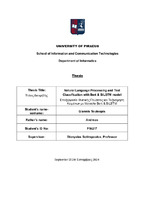| dc.contributor.advisor | Sotiropoulos, Dionisios | |
| dc.contributor.advisor | Σωτηρόπουλος, Διονύσιος | |
| dc.contributor.author | Touloupis, Ioannis | |
| dc.date.accessioned | 2024-11-05T17:36:58Z | |
| dc.date.available | 2024-11-05T17:36:58Z | |
| dc.date.issued | 2024-09 | |
| dc.identifier.uri | https://dione.lib.unipi.gr/xmlui/handle/unipi/16979 | |
| dc.identifier.uri | http://dx.doi.org/10.26267/unipi_dione/4401 | |
| dc.description.abstract | Αυτή η διπλωματική εργασία αναφέρεται στην αρχιτεκτονική των
μοντέλων βαθιάς μάθησης. Αυτό επιτυγχάνεται με τη χρήση μοντέλων
βαθιάς μάθησης για την ταξινόμηση των tweets που σχετίζονται με τον
Covid-19 σε τρεις διαφορετικές κατηγορίες. Η πρώτη κατηγορία αφορά
tweets που είναι υπέρ του εμβολιασμού, συμφωνούν και εφαρμόζουν
μεθόδους προστασίας κατά του ιού. Η δεύτερη κατηγορία αφορά
tweets που είναι κατά του εμβολιασμού και προωθούν θεωρίες
συνωμοσίας. Η τρίτη κατηγορία αφορά tweets που έχουν ουδέτερη
στάση.
Συγκεκριμένα, για την επίλυση του παραπάνω προβλήματος,
συλλέχθηκε ένας αριθμός tweets ώστε να εκπαιδεύσουμε τα δύο
μοντέλα βαθιάς μάθησης που χρησιμοποιούμε, ένα Δικτυακό Μοντέλο
Bidirectional LSTM και ένα μοντέλο Bert. Αυτά τα μοντέλα θα
αναλυθούν και θα εξηγηθούν βήμα-βήμα, και ταυτόχρονα θα δοθεί
έμφαση
σε
κάποιες
διαφορές
μεταξύ
τους.
Για να εκπαιδεύσουμε αυτά τα μοντέλα, έπρεπε πρώτα να συλλέξουμε
και να κατηγοριοποιήσουμε τα tweets. Κατά τη διάρκεια αυτού του
βήματος χρειάστηκε να βρούμε μια νέα μέθοδο συλλογής λόγω
αλλαγών στην πολιτική του Twitter. Επιπλέον, θα παρουσιάσουμε την
προετοιμασία αυτών των tweets ώστε τα μοντέλα να μπορούν να τα
δεχθούν και να τα χρησιμοποιήσουν για εκπαίδευση με τον καλύτερο
δυνατό
τρόπο.
Η όλη προετοιμασία και η διαδικασία περιγράφονται λεπτομερώς
παρακάτω, ενώ στο τέλος παρουσιάζονται τα αποτελέσματα και οι
παρατηρήσεις σχετικά με τα μοντέλα. | el |
| dc.format.extent | 72 | el |
| dc.language.iso | en | el |
| dc.publisher | Πανεπιστήμιο Πειραιώς | el |
| dc.rights | Αναφορά Δημιουργού - Παρόμοια Διανομή 3.0 Ελλάδα | * |
| dc.rights | Αναφορά Δημιουργού - Μη Εμπορική Χρήση - Παρόμοια Διανομή 3.0 Ελλάδα | * |
| dc.rights.uri | http://creativecommons.org/licenses/by-nc-sa/3.0/gr/ | * |
| dc.title | Natural language processing and text classification with Bert & BiLSTM model | el |
| dc.title.alternative | Επεξεργασία φυσικής γλώσσας και ταξινόμηση κειμένων με μοντέλο Bert & BiLSTM | el |
| dc.type | Bachelor Dissertation | el |
| dc.contributor.department | Σχολή Τεχνολογιών Πληροφορικής και Επικοινωνιών. Τμήμα Πληροφορικής | el |
| dc.description.abstractEN | This thesis refers to the architecture of deep learning models . This is
accomplished by using the deep learning models to classify tweets
related to Covid-19 to three different categories. The first category as
tweets which are in favor of vaccination, agree and implement methods
of protection against the virus. The second category as tweets which
are against the vaccination and promote conspiracy theories. The third
category as tweets which they have a neutral stance.
Specifically, to solve the problem above they have been collected a
number of tweets so we can train the two deep learning models we are
using, a Bidirectional LSTM and a Bert model. These models are going
to be analyzed and explained through every step and at the same time
we will emphasize some differences between those two models.
To train these models we have firstly to collect those tweets and
categorize them, also during this step we had to find another collection
method due to twitter policy changes. In addition, we will present the
preparation of those tweets so that the models can accept them and
use them to train as best as possible.
The whole preparation and the process is described in detail later on
and the results and any observations of the models at the end. | el |
| dc.subject.keyword | BiLSTM | el |
| dc.subject.keyword | Bert | el |
| dc.subject.keyword | Transformers | el |
| dc.subject.keyword | Tweets | el |
| dc.subject.keyword | COVID-19 | el |
| dc.subject.keyword | Optimizers | el |
| dc.subject.keyword | Training | el |
| dc.subject.keyword | Machine learning model | el |
| dc.date.defense | 2024-09-30 | |



